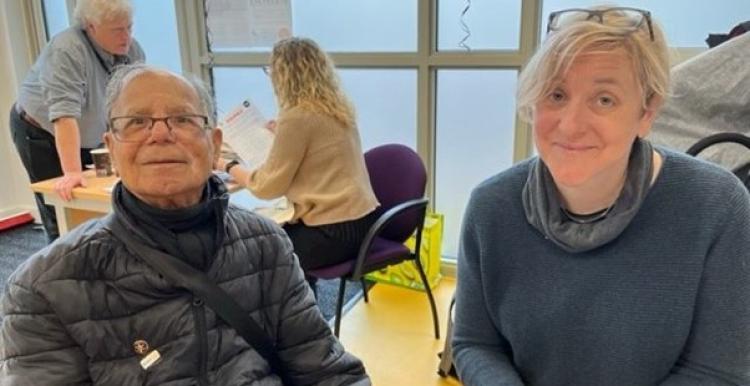Report from our event: How digital technology can help if you are living with sight loss in Wandsworth

Every day 250 people in the UK start to lose their sight and two million people live with the condition.
We wanted to capture the experiences of residents with sight loss and carried out an in-depth survey.
Manager Sarah Cook said:
“The message we got is that sight loss is a personal journey, and everyone has a different experience, but it is vital health and care services gain understanding of the challenges.”
Some people said communications on medical appointments could be improved with new technology and information could be made more accessible.”
After listening to what people said, we teamed up with Katherine Low Settlement, Age UK Wandsworth and Wandsworth Council to turn the spotlight on digital aids and community volunteers who can help.
One of the first barriers people have to using new devices is learning to use them. Across Wandsworth you can bring any technology you need advice on to Digipals drop-in sessions at libraries and the Gwynneth Morgan Day Centre in East Hill, Wandsworth every Thursday.
We have a wonderful team who can help people with digital connectivity.
Emily Foxen from Age UK Wandsworth said: “We have a wonderful team who can help people to benefit from all digital connectivity from shopping online, accessing information and entertainment on the internet or connecting with people via emails, video calls and social media.”
The charity also provides tablets which can be loaned for up to three months where needed.
According to Chris Andrew from the Katherine Low Settlement, digital inclusion is all about human interaction. She runs two weekly groups for people aged over 50, based on digital skills. One is for absolute beginners and the other for those with a bit more experience.
“I want to make it fun showing everyone what can be done. Some of the group members have sensory impairment related to age and need practice with touchscreen skills. We have used musical instrument apps and created our own band with members playing drums, guitar and piano on their tablets. I’ve also supported people to use audio description apps like Google Lens that will read aloud printed text.
I also offer one to ones and home visits and I have been meeting with one woman who is visually impaired over this past year. She has taught me a great deal about the voiceover audio description function on her iPhone and I’ve helped her download and navigate new apps like BBC sounds and iPlayer for on demand entertainment. I’ve also supported her to engage in community apps like Nextdoor so she can feel more connected. Working together like this and sharing skills is key to effective digital inclusion.
"People living with sight loss can come to us for advice on technology to help boost their independence at home- anything from mobiles and tablets to one-cup boilers.”
-Wendy Jones, Digital Manager at Wandsworth Council
Wandsworth Council has a specialist Sensory Impairment Team which can give advice, carry out home assessments and support with applying for grants for essential technology for equipment costing up to £1,000.
Digital manager Wendy Jones said: “People living with sight loss can come to us for advice on technology to help boost their independence at home- anything from mobiles and tablets to one-cup boilers. We will visit people’s homes to find out the right technology to suit their needs.”
![]() Wendy Jones from the Wandsworth Council Sensory Impairment Team
Wendy Jones from the Wandsworth Council Sensory Impairment Team
Devices can include :
- virtual assistants such as Amazon Alexa which play music, read the news,or find useful information on the internet. It can make calls to anyone in your contacts and can turn your heating and lights on if connected to smart light bulbs and order shopping.
- CarePhone- A tablet that works like a phone and video calls at a low cost. Voice activated, it can be useful for reminders for medication and, appointments
- Smartwatch-It includes a tracker that can help if you get lost and can connect you to a call centre if you need help.
- Falls detector-The teardrop device can alert a control centre if anyone falls to get immediate help.
National charity AbilityNet offers support using technology. Volunteers visit people in their homes to help with everyday technology needs. People can make simple changes to their devices by going to My Computer, My Way which is totally free of charge. Disability Consultant, Alex Barker said “Using technology is part of everyday life now, but there are lots of people who struggle. We can help make technology easier.”
The RNIB can provide expert advice on assistive technology. Davinder Kullar from the Royal National Institute of Blind People RNIB said:
“My main message is that you can benefit from technology at any age–my oldest client is 97. We want to encourage more people to benefit from the advantages technology can bring.”
Wandsworth resident Iris Hugh was interested in how the technology could make her life easier living with sight loss. “I am amazed at the range of equipment that can be used and what it can do to help. I am interested in finding out more about the phone.”
Read the Wandsworth Healthwatch report into sight loss and digital technology here:
